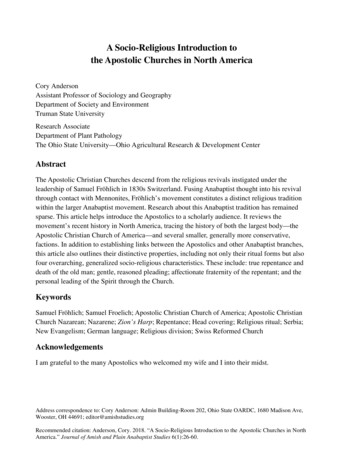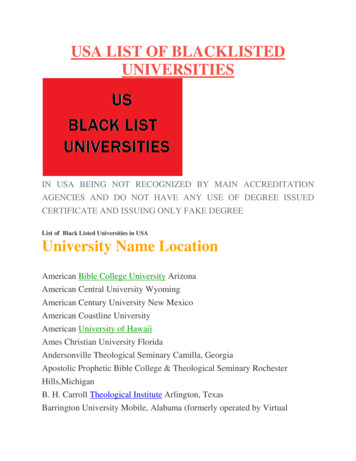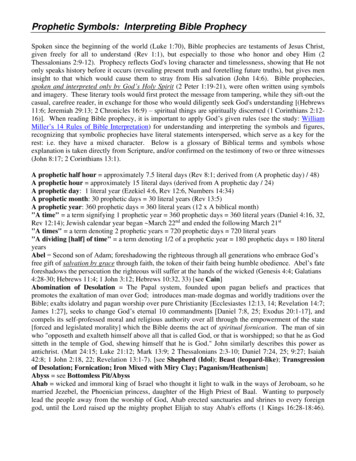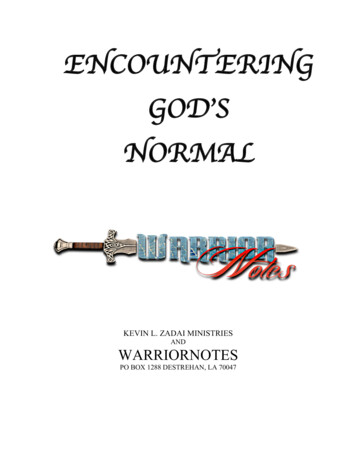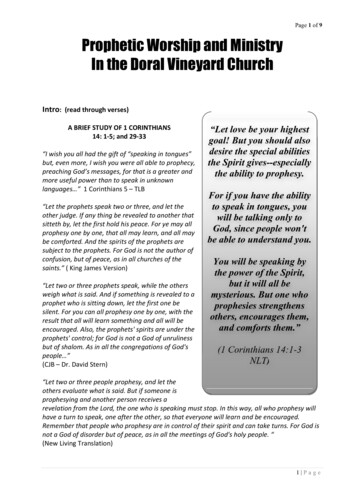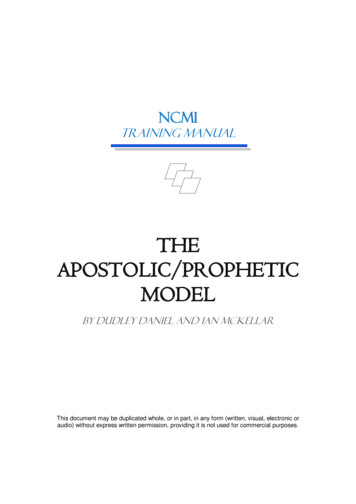
Transcription
NCMITRAINING MANUALTHEAPOSTOLIC/PROPHETICMODELBy Dudley Daniel and Ian McKellarThis document may be duplicated whole, or in part, in any form (written, visual, electronic oraudio) without express written permission, providing it is not used for commercial purposes.
IntroductionThe aim of this course is to give the student an understanding of the Biblicalmodel of what it is to be an apostolic/prophetic people.Our aim is that the student comes away with the understanding that it is theindividual‟s responsibility to take the Gospel into the entire world, and thatthere is a Biblical model (or pattern) that we have been given for this work.Every individual is to be properly based in a local church that is in turnproperly connected to the work of the Kingdom – which is trans-local –through a relationship with an Apostolic/Prophetic team. Included in this workis the establishing of base churches, which in turn would also continue to workin their sphere of ministry and expand, sending forth the good and preciousGospel of our Lord and Saviour, Jesus Christ.2
UNIT ONESETTING THE SCENELearning Outcomes:1. Understand God‟s mandate for the church in today‟s world.2. Identify the three major components needed for the building of thechurch.3. Understand the theological foundation for the Apostolic/Propheticmodel of the church.4. Identify key gifts of the Spirit needed within today‟s church.1.1MANDATE FOR THE CHURCHGo into all the WorldThe heart of Apostolic Christianity is to fulfil the commission given by Jesus to“make disciples of all nations” by planting churches, training leaders andfunctioning as the priesthood. Apostolic Christianity has a passion to go andnot to gather, to send and not to stay. This is a church body that embraces theprophetic purposes of God in every age, and gives everything withoutcompromise to be what God calls them to be and to do what God calls themto do.The mandate of the church is to go into the entire world. Not only to the cities,the suburbs or the streets of one‟s own country, but to the entire world. Thisattitude needs to be expressed in all that we do. The church must be focusedon all believers having a “going” attitude, even if it is only to the neighbour‟shouse. In our hearts we should carry the understanding that every believerand every church has the mandate to be witnesses in “Jerusalem, and in allJudea and Samaria, and to the ends of the earth.” (Acts 1:8) FOR YOUR INFORMATION:ABRAHAM – GENESIS 12:1-3Also known as: Abram (“exalted father”).Name means: “Father of many” or “father of multitudes” (Genesis 17:5).Homes: Ur of the Chaldeans; Haran (11:31); the land of Canaan (Genesis 12:5); Egypt(Genesis 12:10); Beersheba in the land of the Philistines (Genesis 21:34).Family: See Genesis 15:4–6.Best known today as: The patriarch of ancient Israel and the one to whom andthrough whom God promised blessing to all nations (Genesis 12:1–3; 13:14–16; 17:1–8;18:17–19; 22:17–18).11Thomas Nelson, Inc., Word in Life Study Bible [computer file], electronic ed., Logos Library System, (Nashville:Thomas Nelson) 1997, c1996.3
Very often local churches are focused only on their own communities and,while this is a valid „mission field‟, no church should be focused solely on itsimmediate community. The entire church, that means every local expressionof the church, should have a heart for the nations.This is not only a New Testament concept. This is the essence of what is readin Genesis 12:1-3: The Lord asked Abram to leave his country and go to aland God would reveal to Him.Paul, writing to the Galatians, calls these verses the “gospel in advance”; thepromise that all peoples will be blessed through Abram and his seed. Thechurch is also part of the seed of Abram and is subject to the blessings ofAbram.God was so intent on accomplishing this that Christ left heaven and came intothe world to win nations for the Father (John 20:21). Now He is sending thechurch into the world. The church must have this same vision.1.2GOD‟S PLAN FOR THE CHURCH1.2.1 God‟s AgendaWhat is it that God is doing in the world today? The most important issue ofthe world today is what God is doing in and through His church. He does havea very specific agenda in the world. The highpoint of this plan was the comingof Christ and the fulfilment of God‟s plan will be seen when Jesus comesagain.Prior to Jesus, God worked out His plan for humankind through His chosenpeople, the nation of Israel. Since Jesus came, died and rose again. God hasfocused His activity in the world through the church. Israel still has a role toplay in God‟s plan but He has only one Holy nation, which is now made up ofboth Jew and Gentile. The church was created to be the primary vehicle forGod‟s work in the earth.If God‟s mandate for the church is to make disciples of all nations, what thenis his agenda with the Church? Surely it must be to bring us to the placewhere we can best fulfil our mandate.God has often worked with a wineskin that has not been able to sustain theflow of the new wine to the thirsty.Throughout Church History there have been various moves of holiness andthe fear of God, but none of them have been sustained. The same is true forvarious moves of power and healing.There are many that pray for revival, for a restoration of reverence for God inthe church. Some focus on holiness and holy living, others only wait for signsand wonders, many Christians believe today is the „harvest time‟, others willsay that God is restoring the apostles and prophets to the church. These and4
other moves of God are all part of His agenda, but many have failed to find asustained expression in the Church.This is not only true of moves that took place in the last seven or eightcenturies, but it is also true of some of the most powerful moves of God thattook place at the inception of the churches, like Turkey, where there arealmost no believers left. What has happened to the church?We believe that the reason for this is that the pattern of God for the churchwas lost and, as a result, there was nothing that could sustain the ways, thework or the moves of God. Therefore, God‟s highest priority is to prepare awineskin that can do this, a wineskin that is suitable for the administration ofthe Kingdom of God.First and foremost, God is building a wineskin that can contain all that Hewants to do in and through the church in a sustained manner. God‟s primaryfocus is to build a wineskin that is true to His Word.1.2.2 The Wineskin suitable for the Administration of God‟s KingdomThe wineskin is the church. God is building a wineskin that is true to His Wordand He is building it for eternity. Therefore, the duty of the believers in thechurch is to give ourselves to be building a church in accordance with God‟sWord and His ways.God is building a wineskin that is able to contain all that He wants to do in andthrough the church in a sustained manner. Revivals, holiness, gifts of theSpirit are all important and vital to the development of the church, but theycannot be sustained unless there is a wineskin to properly contain andadminister them.Everything in the church, the structure, programmes, and even the leadership,should facilitate the administration and sustaining of the flow of the new winethat God is pouring out. We need to remember that the things of the Spirit areorganic and will not suffer being limited by organisational models. What weneed is God‟s model. We cannot simply apply any model that we have seenthat works in the world. Therefore, the constant challenge for the Church is tobe adjusting everything that is done in order to facilitate the in-flow andoutworking of the new wine. This adjustment must be made in response towhat we see in God‟s Word.There are many things that constitute a wineskin that is suitable for theKingdom of God. We will examine some of these in the next unit.5
Search the Globe: Read Matthew 9:16, 17; Mark 2:21, 22; Luke5:36–39. Jesus makes a valid illustration of this new gospel of grace.What areas in your life are you holding on to past traditions? KEY CONCEPT: Avoid emphasising past traditional structures on presentchanges. Understand that yesterday‟s structures and forms are often unable tohandle today‟s lively spiritual renewal.21.3THE MODEL OF THE CHURCH1.3.1 Introducing The Apostolic/Prophetic ModelThe model of the church must be rooted in the Bible and not in the ways ofthe world. There are many successful models around, especially in thebusiness arena, but success does not indicate that something is founded ontruth. We believe that God has given us a model for the church in Scripture,and the term to describe this is “Apostolic/Prophetic Model”.Apostolic is a “going” culture. It is a culture that is intent on sending and noton staying, on giving and not on getting. Many pastors are only gatheringpeople because it looks good when there are many people who come to listento them teach.It is an apostolic church that is able to properly fulfil this mandate. Theapostolic continuously calls us to remember that: The mandate is not a staying mandate, it is a sending mandate.The mandate is not a gathering mandate; it is a going mandate.The mandate is not a getting mandate; it is a giving mandate.All of this must take place through the legitimate channels that we see inScripture.Prophetic authority is given to establish a passion for Jesus and anuncompromising heart to do things God‟s way. It continuously points thepeople of God to the picture, or pattern, that God has for the church. The2ThomasNelson, Inc., Word in Life Study Bible [computer file], electronic ed., Logos Library System, (Nashville:Thomas Nelson) 1997, c1996.6
prophetic thrust is for the church to become all that God has designed it to be.A prophetic people are those who have the ability to see the future as Godsees it, to prepare for the future and to become the future. What do we meanby this?God‟s people have always been prophetic by nature. i.e. they have had theability to hear God and have an understanding of his plans and purposes andcan then, by faith, move into them.In the Old Testament God revealed his plans through his servants theprophets. “Surely the Lord God does nothing, Unless He reveals His secret toHis servants the prophets”. Amos 3:7 (NKJV)In the New Testament, we see the prophetic gifting and anointing finding it‟sfullest expression in Jesus. Jesus in turn passed this prophetic anointing onto the church and, although that is done specifically through the office ofprophet, there is now a sense in which all of His people are prophetic becausewe all have access to Him and to the gift of the Holy Spirit.Jesus is the head of the church. If the church is operating out of relationshipwith Him and is appropriating the gifting that he has passed on to the churchin the power of the Holy Spirit, it follows that the church can enjoy the sameprophetic nature as the Lord of the church. For this reason, the church is bynature and gifting prophetic.The prophetic only exists because God reveals “His secrets.” He has alwaysdone this and has preserved all of that which is relevant for this age inScripture. Only that which aligns with Scripture is truly prophetic. Anythingoutside of this is not valid. We are still dependent, however, on the work of theHoly Spirit to help us understand what is recorded in Scripture, to see theplans that God has for His people, and to know how to apply that to our lives.When we say that a prophetic people see the future, we mean that they seewhat God sees for His church and reveals through Scripture and the work ofthe Holy Spirit. A healthy dependence on God acknowledges our need for thisongoing work of the Holy Spirit, and it is in the nature and ways of God to giveus this „revelation.‟ He has always done this and He will not stop doing it untilthis age has passed. Without it we cannot know His plan and purpose for us.In other words, through the current work of the Holy Spirit we have the abilityto hear God‟s plans and purposes for the future and can, by faith, make thenecessary adjustments in our lives and walk into the future, or become thefuture. Which is simply saying that we become all that God intends us to beand do all that He intends us to do.1.3.2 A Theological Foundation for This ModelWe believe this is a model that is found throughout the Bible and it is the onlyone that can be called a whole-Bible model for the church. Some of themodels that have been applied in the past have emphasised aspects that are7
only a part of the whole model. They are all included in theApostolic/Prophetic model and this is what the church needs; a model thatembraces and is able to effectively work out the whole of Scripture.What this statement is saying is that the apostolic heart and pattern is not onlya New Testament teaching or experience. It has always been in the heart ofGod. In the New Testament we see the apostolic heart and pattern cominginto sharper focus with the coming of Jesus and as it is fleshed out in His lifeand ministry and we see it through with the apostles (and prophets) that Hegathered around him and sent out.From the beginning, it has always been in the heart of God to bless allnations. We see this in the life of Abraham. He was called to go and be ablessing, which would impact nations for all generations.Genesis 12:2 (NKJV) “I will make you a great nation; I will bless youand make your name great; and you shall be a blessing. I will blessthose who bless you, and I will curse him who curses you; and in youall the families of the earth shall be blessed."Abraham‟s call was apostolic. i.e. he was sent out.Hebrews 11:8 (NKJV) “By faith Abraham obeyed when he was calledto go out to the place, which he would receive as an inheritance. Andhe went out, not knowing where he was going.”There was a prophetic element to his going as well. He went, not knowing, yettrusted that God would open up and reveal the way to him.Hebrews 11:10 (NKJV) “For he waited for the city which hasfoundations, whose builder and maker [is] God.”As he moved forward in faith, God did give him understanding and opened upthe way before him. As he walked in obedience and faith, he experienced thefulfilment of God‟s prophetic word to him, viz. “And in you all the families ofthe earth shall be blessed."Israel as a nation was always called by God to be a blessing to the nations.God always drew their attention to this and made it an integral part of thetemple – His dwelling place on earth.Isaiah 56:7 (NKJV) “Even them I will bring to My holy mountain, And makethem joyful in My house of prayer. Their burnt offerings and their sacrifices[will be] accepted on My altar; for My house shall be called a house of prayerfor all nations."David Bosch says, “It is not true that there is mission because there isChurch; rather, there is Church because there is mission.” This is also true forthe Old Testament. There has always been a mission. Mission is not a NewTestament idea. God‟s „mission‟ from the beginning has been to reach the lost8
through his chosen instruments – through the called out ones, His chosenpeople – the ekklesia. First with Israel (a light to the Gentiles) and thenmoving toward the full revelation of this in the life and ministry of Jesus and inthe Church.The Apostolic/Prophetic model is reflected throughout scripture as a recurringtheme and pattern. God is continually „sending,‟ continually working throughhis chosen instruments to reveal himself, His will and His way. It can be saidthat God Himself is apostolic by nature. i.e. He is a sending God. He sent HisSon into the world to save it. Just as He made Israel a prophetic people, wesee the ultimate revelation of His prophetic purpose in Jesus. The mandate isthen passed onto the Church through which He intends to “disciple thenations.”When Jesus came into the world He gathered disciples around Himself andsent them out. So Jesus said to them again, "Peace to you! As the Father hassent Me, I also send you." John 20:21 (NKJV)In the same way, the apostles gathered and sent, having prophetic impactupon the nations they were sent to.Christian leaders are called to help God‟s people discover, develop in,demonstrate and delight in a whole Bible, Kingdom of God, Word of God,Apostolic/Prophetic culture. There is a liberty and a reality to this culture. Ithas authenticity.While this is a supernatural culture, it is not unnatural. Sometimes the two areconfused and what is supernatural is actually regarded as “eerie”, or mayhave an unnatural spirituality that is not properly rooted in the whole of God‟sWord. God‟s model, however, is one that is real, liveable, and enjoyable. Itworks.I believe that this model incorporates all that the New Testament church everwas and all that it was meant to be. An Apostolic/Prophetic model thereforeincludes the restoration of what was lost, what was stolen and also what ismost needed. This is a model for the whole of church life, one that isapplicable to every church and to every believer.The foundation of every local church and believer should include thefollowing: Jesus Christ as the chief cornerstone (Ephesians 2:20). The Word of God (Matthew 7:24-27). The foundations of the church being laid by apostles andprophets (Ephesians 2:20).9
CONSIDER THIS:EPHESIANS 2:19–22Many church buildings in the United States and Europe receive special protectionfrom various different agencies. Historians research these landmark buildings, and visitorstour them. Paul regards the community of believers at Ephesus as a special building.Apostles and prophets are the foundation, and Christ is its cornerstone. Jews and Gentilesare carved into living bricks and put together, until it becomes the “dwelling place of God.”Such an assembly is so unique, so full of grace, that Paul gives the building specialrecognition. What are you and your fellow believers doing to construct a holy dwelling placefor God?31.3.3 The Theological Ground we Stand OnAlthough we are focussing on the Apostolic/Prophetic ministry we doacknowledge that all of the five-fold ministries are still valid and indeednecessary.Paul says that they are necessary:“ for the equipping of the saints for the work of ministry, for theedifying of the body of Christ, 13 till we all come to the unity of the faithand of the knowledge of the Son of God, to a perfect man, to themeasure of the stature of the fullness of Christ; Eph 4:12 (NKJV)Until this Scripture is fulfilled we have need of all of these ministries.The theological ground we stand on takes the view that the ministry giftsmentioned in Eph 4 are valid and operative in the church today.We understand that there are other theological points of view about theseministries, but it is not the purpose of this course to debate these issues.Therefore when it comes to discussing the function of the apostolic andprophetic ministries we will take that as a given in the context of this course.1.3.4 Laying the Foundation For The ChurchClearly the foundation that is laid is Jesus Christ Himself and is thus the onlyvalid foundation for the church. This is non-negotiable. However, all three ofthe elements mentioned above, including the need for apostles and prophetsto lay the foundations, apply today as much as they did to the early church.For a long time, however, there has been little or no acknowledgment ofapostles and prophets being valid and necessary in the post-New Testamentera. That is changing, but we do not only want these ministries to return asanother set of titles that some can apply to themselves. We need genuine3ThomasNelson, Inc., Word in Life Study Bible [computer file], electronic ed., Logos Library System, (Nashville:Thomas Nelson) 1997, c1996.10
apostolic and prophetic ministries that build into churches in the way that Goddesigned them to. Their role is to help the church establish Jesus as theprimary foundation (1 Corinthians 3:11), and align all forms of structure toHim, the Chief Cornerstone, and to build according to the pattern that Godhas revealed in His Word.The apostolic and the prophetic gifts are designed to work together inestablishing churches. The apostolic is designed to work with the prophetic,and the prophetic is designed to work with the apostolic. This does not reducethe importance of the gifts; each ought be working together in a team to equipthe saints. In the context of establishing the church on a correct Biblicalmodel, however, these two have a specific, God-ordained role to play.Apostolic authority is given to ensure that the church is correctly joined to theHead of the church (Jesus) and to the rest of the Body. It is also given toestablish in local churches aspects of the whole-Bible theology of church.There is no disputing that the foundation of the Church universal has alreadybeen laid. This is an established fact and no other foundation can be laid butthe one that has already been laid, which is Jesus – 1Corinthians 3:11.The same is in fact true for everything that Jesus has established. Thesecannot be established again and do not need to be established again. Let ustake for example the cross of Christ.The cross with all its power and merits has happened. It took place in timeand history. Yet it‟s power can only be effective today for those who embraceit in repentance and faith. What happened nearly 2000 years ago I have toembrace as truth and appropriated by faith and obedience before that realityis appropriated and established in my life. Without that response, the cross ismerely an event in history or a theological concept. It‟s power and significanceis lost to me.In the same way, the apostles and prophets have already laid the foundationof the Church, with Christ as the cornerstone. That too can simply be atheological concept, unless appropriated by the church in faith and obedience.Therefore, even though it is true that the foundation was laid for the ChurchUniversal by the apostles and prophets, the present church must apply theimplications of those foundations today. There is a need for the present dayapostles and prophets to lay those same foundations anew in every new localchurch plant. Just how that is done has to be thought through and properlydefined. This is what we hope to achieve with this course.One could conclude that the ministry of the present apostles and prophets isreally not that necessary if we limit the laying of foundations required by alocal church to the original foundations laid. However, the reality oftenencountered by present apostolic teams are churches started and planted thathave little or no foundations, and require a reconstruction process by apostlesand prophets whereby they re-lay good foundations.11
Some situations we have encountered required the existing church to beclosed down because of the lack of foundations, or faulty foundations, and anew one started in its place with Biblical foundations.Again there are situations where churches have inadequate foundationsresulting in a variety of problems. In such cases the ministry of apostles andprophets are given by God precisely to come in and correct the situation,relaying some foundations and strengthening others.It is for these reasons that the work of the apostolic and prophetic ministries tolay these foundations in each church is still of utmost importance today.These ministries play a vital and necessary role in building into the foundationof local churches a full expression of the Apostolic/Prophetic model that wesee in the Bible.Later on in the course we will be dealing specifically with the work of theapostolic/prophetic ministry. Hopefully your understanding of the subject willbecome clearer.Review:1. I believe the pattern of God for the church was lost.2. The church must be true and built up by the sustainableWord of God.3. Foundation is important and must incorporate Jesus (asthe Cornerstone), the Word of God and the apostolicand prophetic ministries (Ephesians 2:20).4. The mandate of the church is to go into the entire world.5. God has a plan for the church and His highest priority isto prepare a suitable church for His kingdom.6. Everything in the church, the structure, programmes,and leadership facilitates the accommodation of thenew wine.Now try the Self-test on the next page.12
Self-test:1. According to the authors what is God‟s mandate for the church?2. According to the authors what is God‟s primary focus?3. What should the foundation of every local church and believer include?4. Prophetic authority is given to establish ?5. What facilitates the accommodation of the new wine?6. In this unit what functions of Christian leaders are emphasised?7. I believe that God has given us a model for the church in Scripture, and thebest term to describe this isCompare your answers with mine on the next page.13
Self-test: Answers1. According to the authors what is God‟s mandate for the church?The mandate of the church is to go into the entire world.2. According to the authors what is God‟s primary focus?God‟s primary focus is to build a wineskin that is true to His Word.3. What should the foundation of every local church and believer include? Jesus Christ as the chief cornerstone (Ephesians 2:20).The Word of God (Matthew 7:24-27).The foundations of the church being laid by apostles andprophets (Ephesians 2:20).4. Prophetic authority is given to establish ?Prophetic authority is given to establish a passion for Jesus and anuncompromising heart to do things God‟s way.5. What facilitates the accommodation of the new wine?Everything in the church, the structure, programmes, and leadershipfacilitates the accommodation of the new wine.6. In this unit what functions of Christian leaders are emphasised?Christian leaders are called to help God‟s people discover, developin, demonstrate and delight in a New Testament, Kingdom of God,Apostolic/Prophetic culture.7. I believe that God has given us a model for the church in Scripture, and thebest term to describe this isApostolic/Prophetic Model14
UNIT TWOTHE PATTERNLearning Outcomes:1.2.3.4.5.2.1Identify and explain God‟s pattern for the church.Understand the foundation and importance of God‟s church.Define and correctly identify the major aspects of the church.Grasp the apostolic pattern introduced by the ministry of Paul.Understand the importance of the 14 key strategies associated withthe apostolic pattern.A CONTEXT FOR CHANGE2.1.1 The Authority of the BibleThe Bible is the final and full authority for the whole of our lives, bothpersonally and corporately. This must be true for every issue we discuss. Ifwe find something in the Word of God that does not fit with what we havethought or believed in the past, we have to put aside our preconceptions, ourpride and prejudice, take a stand and decide that no matter who thinks what,we will do the Biblical way.We are living in a time that some have referred to as one in which we will seethe “restoration of all things”. By implication, every one of us has to change,preacher and hearer alike. The Word of God should direct that change. Ibelieve Acts 15 tells us that God is restoring the fallen tabernacle of David.Some have taken this to mean a restoration in the area of praise and worship,but I think it is more than that. FOR YOUR INFORMATION:DAVID – 1 SAMUEL 16Also known as: “sweet psalmist of Israel” (2 Samuel 23:1). David was the second and greatestking of Israel (1010-970 BC), whose dynasty ruled Judah for over four hundred years.Name means: “beloved”Homes: JudahFamily: David belonged to the tribe of Judah and was born in Bethlehem to Jesse as the youngestof eight sons. David married Bathesheba.Best known today as: The author of many Psalms (almost one-half are attributed to him in thetitles of the KJV). God promised David a kingdom without end (2 Samuel 7:14-16).4I believe there is a Davidic wineskin that God is restoring. It was under Davidthat Israel saw its greatest victories and took the most territory. David had aheart to do things God‟s way. He diligently applied the Word of God in His life.4ThomasNelson, Inc., Word in Life Study Bible [computer file], electronic ed., Logos Library System, (Nashville:Thomas Nelson) 1997, c1996.15
Even when he failed God, he turned back to God and did not hold onto hispride or his own way. The Davidic wineskin, I believe includes the churchbuilt, without compromise, according to the Word of God, and built accordingto the ways of God.If God‟s Word threatens our present modus operandi, preferences ortheologies, then let change come. Our attitude and response needs to begrounded in the kind of understanding we have from Acts 17:30. In times ofignorance God overlooked things “ but now He commands all peopleeverywhere to repent.” While this relates specifically to our initial repentancein response to the gospel, I believe that it also has an implication that requiresus to be constantly repenting of wrong understanding, or modus operandi, inresponse to the revelation of God.In Exodus 25:8 God commanded that a sanctuary be built for Him to dwell inand that it be built exactly according to a specific pattern that He gave tothem. Here, even under the old covenant, He gives incredible detail.In Chronicles 15:13 we read again that there was a definite pattern, aprescribed way that God had for the Ark to be carried. They made the mistakeof not finding out what the prescribed way was a great blessing broke out.Discover! Consider of the following plans God has set forth.Identify and explain the purpose for each.Tabernacle of Moses (Exodus 25-27):Temple of Solomon (1 Chronicles 29; 2 Chronicles 2:1-16):Ezekiel‟s Temple (Ezekiel chapters 43 – 45)Time and time again in the Old Testament, God gave detailed plans andpatterns for His house and for the way He wanted things done. He has alwayshad prescribed ways. If He had such a definite pattern for the tabernacle ofthe Old Testament, then surely He has no less than that for the chu
prophetic purposes of God in every age, and gives everything without compromise to be what God calls them to be and to do what God calls them to do. The mandate of the church is to go into t


